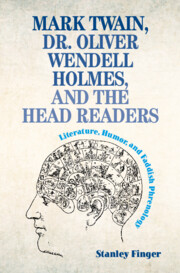 Mark Twain, Dr. Oliver Wendell Holmes, and the Head Readers
Mark Twain, Dr. Oliver Wendell Holmes, and the Head Readers Book contents
- Mark Twain, Dr. Oliver Wendell Holmes, and the Head Readers
- Mark Twain, Dr. Oliver Wendell Holmes, and the Head Readers
- Copyright page
- Epigraph
- Contents
- Tables and Figures
- Preface
- 1 The Birth of a Controversial Doctrine
- 2 Coming to America
- 3 Skeptical in Hannibal
- 4 The River, the West, and Phrenology Abroad
- 5 Mark Twain’s “Small Test”
- 6 Tom, Huck, and the Head Readers
- 7 More Head Readings and a Phrenological Farewell
- 8 Young Holmes and Phrenology in Boston
- 9 An American in Paris
- 10 Quackery and Holmes’s Head Reading
- 11 Holmes’s Professor on “Bumpology”
- 12 Holmes’s “Medicated Novels”
- 13 Mr. Clemens and Dr. Holmes
- 14 Phrenology Assessed
- Epilogue
- References
- Index
11 - Holmes’s Professor on “Bumpology”
Published online by Cambridge University Press: 17 April 2023
- Mark Twain, Dr. Oliver Wendell Holmes, and the Head Readers
- Mark Twain, Dr. Oliver Wendell Holmes, and the Head Readers
- Copyright page
- Epigraph
- Contents
- Tables and Figures
- Preface
- 1 The Birth of a Controversial Doctrine
- 2 Coming to America
- 3 Skeptical in Hannibal
- 4 The River, the West, and Phrenology Abroad
- 5 Mark Twain’s “Small Test”
- 6 Tom, Huck, and the Head Readers
- 7 More Head Readings and a Phrenological Farewell
- 8 Young Holmes and Phrenology in Boston
- 9 An American in Paris
- 10 Quackery and Holmes’s Head Reading
- 11 Holmes’s Professor on “Bumpology”
- 12 Holmes’s “Medicated Novels”
- 13 Mr. Clemens and Dr. Holmes
- 14 Phrenology Assessed
- Epilogue
- References
- Index
Summary
Holmes was one of the founders of the Atlantic Monthly, which quickly achieved a large readership, helped by a pithy serial that appeared in 1857–58. This was Holmes’s The Autocrat of the Breakfast-Table. It involved an erudite man and others at a Boston boardinghouse, who expressed opinions on many subjects. The series proved so popular that he came forth with a sequel in 1859. He called it The Professor at the Breakfast-Table. Holmes used the Professor in the latter to pillory phrenology. He repeatedly referred to it as “pseudo-science,” explaining that it was based on only accepting positive cases and ignoring all exceptions. Using a two-column format and a lot of humor, his Professor contrasted what a phrenologist might tell a client and what he might reveal to his pupil. And he emphasized that phrenologists were not really reading heads, attending instead to other cues, such as how a client dressed and answered questions. The remainder of this chapter shows how others lampooned the head readers before Holmes, and presents his 1861 Harvard lecture, which has the same take-home message. Notably, he praises phrenologists in this lecture for helping to draw attention to human differences, inborn tendencies, and the brain.
Keywords
- Type
- Chapter
- Information
- Mark Twain, Dr. Oliver Wendell Holmes, and the Head ReadersLiterature, Humor, and Faddish Phrenology, pp. 226 - 244Publisher: Cambridge University PressPrint publication year: 2023


